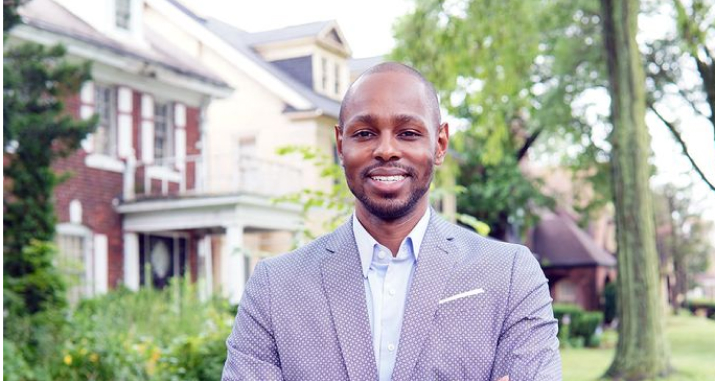
How the pandemic has changed Detroit’s view of microbusinesses
Q&A
How the pandemic has changed Detroit’s view of microbusinesses

The goal to have the nation’s most equitable economy will rest more on home-based businesses, says small business advocate Pierre Batton.
Detroit’s economy was showing signs of growth before the pandemic slowed everything down. That forced people like Pierre Batton, Executive Vice President of Small Business Services at the Detroit Economic Growth Corporation*, to quickly come up with new ideas for how to help small businesses survive. In the process, the DEGC, a nonprofit private entity created by Mayor Coleman Brown in 1978 to design and implement programs to strengthen the city’s economy, discovered new truths about the importance of microbusinesses to Detroit’s future, and how best to help them in the future.
Our goal is to make Detroit the most inclusive and the most equitable place for small business development in the country. We offer a number of services to accomplish this. For example, our Motor City Match program helps new and growing businesses find appropriate real estate in Detroit, and we have a team of business liaison specialists who can help business owners navigate city processes and procedures — kind of like having your own business Sherpa to hold your hand.
Detroit Means Business is a coalition of 65 entities, including local businesses, the City of Detroit, the University of Michigan, and financial institutions including Huntington Bank, PNC and JPMorgan Chase that came together to help our businesses stay open during the pandemic. That’s grown into a five-year initiative to help assess Detroit’s small business ecosystem and address barriers to small businesses’ success. Our goals include awarding $2 billion in new contracts for businesses led by people of color, and to invest an additional $250 million, 90% for businesses led by people of color. We also have a goal to help 5,000 existing SMBs achieve a 50% increase in revenue from pre-COVID levels.
We knew there was a digital divide before the pandemic. But when the lights went out on the economy, you really didn’t exist if you couldn’t take orders online. So one of our Northstar goals is to help 25,000 small businesses create and implement a custom digital strategy for their business. That’s about a third of all the small businesses in the city, so that’s a big, hairy, audacious goal.
There’s not much rhyme or reason to what’s happening. Some are struggling really badly, but some are doing better than ever. One owner told us the other day, “I’m struggling, because I’ve never had to deal with growth like this.” As one of my colleagues says, managing abundance is harder than managing scarcity, because it’s easy to say no to things when you don’t have the resources. So we’re trying to help these companies think this through, so they don’t lose the opportunities that are presenting themselves as they become digital and can sell outside of their neighborhoods.
Economic development people talk a lot about the need for businesses to learn to adapt. But when you’re talking about microbusinesses, you’re usually talking about a single person. And asking someone to completely change the way they’ve done things for years is asking a lot. So we have to stop this antiquated model of trying to teach small business owners how to be everything — an expert accountant, an expert marketer and an expert at everything else. We should focus instead on teaching people about why they should get help and how to do it, and then make sure we’re providing a full ecosystem of resources they can tap into.
Yes. It’s time to acknowledge that, depending on what part of the country you’re looking at, 80% to 90% of all businesses are non-employer firms. So we need to shift how we grow our economy. Sure, cities are always going to want to compete for big firms that can bring 10,000 jobs. But it’s becoming more about how to give microbusinesses and small businesses a fighting chance.
GoDaddy had a different way of looking at the impact of microbusinesses. When you think about Detroit from an economic development standpoint, the first thing that pops into people’s mind is a vacant building, right? Oftentimes, our economic development strategies were built on the assumption that at some point, every business owner is going to want to open a storefront or move into an office. But if it makes sense for a stylist to cut hair in her living room, then great. In the meantime, how can we help her properly document her income so she can get a loan if she wants to open a salon five years from now.
It’s on us as an ecosystem to play a stronger role in validating that it’s okay to work from your living room, and that having a commercial storefront doesn’t make you any more legitimate. Take that stylist. As soon as she opens a salon, she’s spending probably 50% less time cutting hair. She’s managing the shop and talking to the landlord because the roof is leaking. So if moving into a salon helps her grow, great. But it may not be the optimal path for her. We should stop pushing everyone in a single direction.
The Venture Forward survey asked business owners to name their top concern. Of course, everybody says access to capital, right? That’s a given. But there was a follow-up question: What would you do with the capital if you got it? The clear answer was that owners want help with marketing. So we’re making sure they have access to a full ecosystem of marketing partners, even if it’s just helping them find a college student to do social media for 15 hours a week.
We’re trying to figure that out. Because you’re right. For example, if the goal is to make your city a better place for people of color to start businesses, historical models and metrics probably aren’t going to work, because they are what led to the inequities we have today. So you have to be open to the idea that best practices may not exist. You have to be willing to be a trailblazer.
* In January 2022, Pierre began a new role as the Detroit Corporate Responsibility Lead & Program Officer for Global Philanthropy at JP Morgan Chase.
You May Also Like

The GoDaddy Venture Forward December 2021 report is live
Venture Forward’s new research report provides insight into the verticals and demographics benefitting most from the 2020-2021 microbusiness boom.
Read the article entitled “The GoDaddy Venture Forward December 2021 report is live”
Brookings Institute: Microbusinesses flourished during the pandemic. Now we must tap into their full potential.
With more than 2.8 million online microbusinesses launching just last year in the U.S., now is the time to consider policies to target the entrepreneurs’ specific needs.
Read the article entitled “Brookings Institute: Microbusinesses flourished during the pandemic. Now we must tap into their full potential.”
Pushing for change in Chicago: An interview with small business advocate Elliot Richardson
About a decade ago, Elliot Richardson, a small business owner and law firm partner, became increasingly convinced Chicago’s small business community could advocate for itself more effectively.
Read the article entitled “Pushing for change in Chicago: An interview with small business advocate Elliot Richardson”